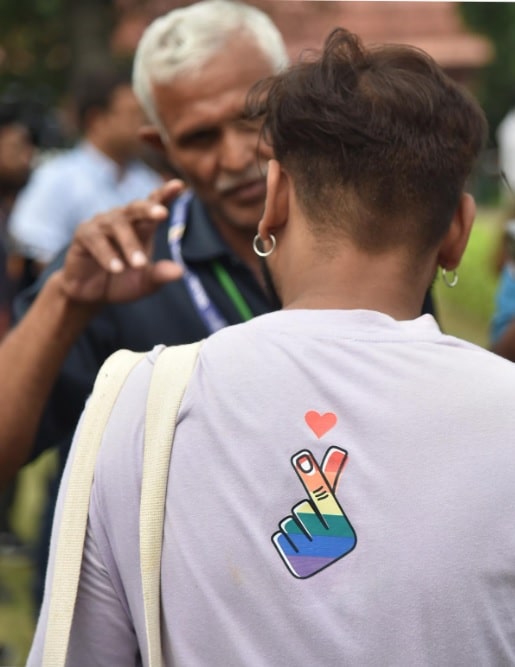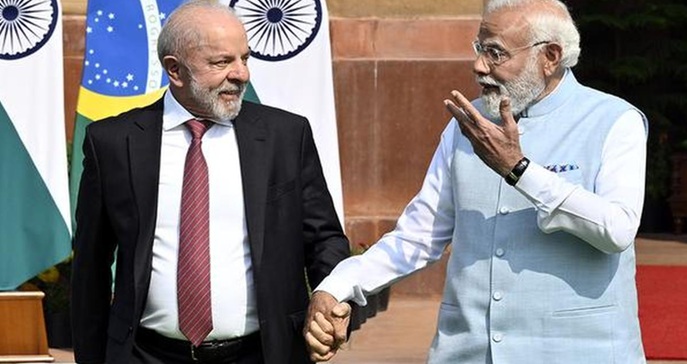What’s in today’s article?
- Why in news?
- What is Special Marriage Act (SMA), 1954?
- What is civil union?
- How is a civil union different from marriage?
- Key takeaways from the verdict
Why in news?
- A five-judge Constitution Bench headed by Chief Justice of India (CJI) D Y Chandrachud unanimously declined to recognise same-sex marriages.
- The Bench, in a 3-2 majority verdict, also declined to allow civil unions for non-heterosexual couples.
Special Marriage Act (SMA), 1954
- Background:
- All marriages in India can be registered under the respective personal law -Hindu Marriage Act, 1955, Muslim Marriage Act, 1954, or under the Special Marriage Act, 1954.
- It is the duty of the judiciary to ensure that the rights of both the husband and wife are protected.
- About
- The Special Marriage Act, 1954 is an Act of the Parliament of India with provision for civil marriage for people of India and all Indian nationals in foreign countries, irrespective of religion or faith followed by either party.
- A marriage under the Special Marriage Act, 1954 allows people from two different religious backgrounds to come together in the bond of marriage. It lays down the procedure for both solemnization and registration of marriage
- Key provisions
- Prior notice to the marriage officer
- The couples have to serve a notice with the relevant documents to the Marriage Officer 30 days before the intended date of the marriage.
- Registration process
- Both parties are required to be present after the submission of documents for issuance of public notice inviting objections.
- Registration is done 30 days after the date of notice after deciding any objection that may have been received during that period by the SDM.
- Both parties along with three witnesses are required to be present on the date of registration.
- Prior notice to the marriage officer
What is civil union?
- A civil union under the Special Marriage Act is a legally recognized union between two individuals, regardless of their caste, religion, or nationality.
- It also refers to the legal status that allows same-sex couples specific rights and responsibilities normally conferred upon married couples.
- This type of union allows couples to have a formal, legally binding relationship without going through the traditional rituals and customs of a religious or cultural marriage ceremony.
- Although a civil union resembles a marriage and brings with it employment, inheritance, property, and parental rights, there are some differences between the two.
How is a civil union different from marriage?
- Religious or cultural beliefs do not play a role in a civil union, whereas they often do in a marriage.
- In some countries, civil unions are only available to same-sex couples, whereas marriage is available to both same-sex and opposite-sex couples.
- A civil union may not be recognized by all states or countries, whereas a marriage is generally recognized worldwide.
Key takeaways from the verdict
- Right to marry not a fundamental right
- All five judges on the Bench agreed that there is no fundamental right to marry under the Constitution.
- Not possible to tweak the Special Marriage Act (SMA), 1954
- All five judges also unanimously agreed that it is not possible to tweak the SMA 1954 by using gender neutral language to allow same-sex marriage.
- The petitioners had asked the SC to interpret the word marriage as between spouses instead of man and woman.
- Alternatively, the petitioners had asked for striking down provisions of the SMA that are gender-restrictive.
- CJI said striking down the SMA provisions would jeopardise the legal framework for interfaith and inter-caste couples.
- He added that interpreting the SMA in a gender-neutral way would amount to judicial lawmaking, which would violate the doctrine of separation of powers.
- All five judges also unanimously agreed that it is not possible to tweak the SMA 1954 by using gender neutral language to allow same-sex marriage.
- Declined to allow civil unions for non-heterosexual couples
- The bench ruled in a 3:2 verdict against civil unions for non-heterosexual couples.
- The dissenting judges said that the right to form unions emanates from the fundamental right to freedom of speech and expression, and the right to life.
- The minority views of the two judges held that the right to enter into a union cannot be restricted on the basis of sexual orientation.
- Discrimination on the basis of sexual orientation is violative of Article 15 of the Constitution.
- The majority views held that it was for the legislature, and not the Court, to formally recognise and grant legal status to non-heterosexual relationships.
- On the bouquet of rights
- On the bouquet of rights, all five judges took note of the Centre’s stand that a high-level Cabinet committee will look into rights that can be conferred on non-heterosexual couples.
- This would range from opening joint bank accounts, same-sex spouses being a beneficiary for provident fund, pension or inheritance to such spouses, being able to take medical decisions for the other spouse, etc.
- On rights to adopt children
- The SC agreed unanimously that one’s sexual orientation cannot decide the capability or suitability of being adoptive parents.
- However, the apex court, in a 3:2 split verdict, held as valid the existing regulations that deny unmarried couples, including queer, the right to adopt a child as a couple.
- Since a same-sex couple cannot marry under Indian law, it follows that they cannot also adopt children as a couple.
- However, since the Juvenile Justice Act 2015 permits a single person to adopt a child, same-sex couples were able to adopt children by designating one of the partners as the legal parent.
- In 2022, however, the Central Adoption Resource Authority (CARA) put paid to this arrangement by issuing the Adoption Regulations.
- This regulation required a couple to be in a two-year stable marital relationship to be eligible for adoption.
- Over and above this, a circular was also issued prohibiting a person from adopting a child if that person was in a live-in relationship.
- Consequently, queer couples became ineligible to adopt.
- The minority view by CJI Chandrachud and Justice Kaul said the Central Adoption Resource Authority (CARA) guidelines discriminate against atypical, unmarried couples to adopt children.
- CARA, a government agency under the Union Ministry of Women and Child Development, lays down the rules for adopting children in India.
Q1) What is Central Adoption Resource Authority (CARA)?
The Central Adoption Resource Authority (CARA) is a statutory body of the Ministry of Women and Child Development in the Government of India. CARA was established in 1990. It monitors and regulates in-country and inter-country adoptions of Indian children.
Q2) What are fundamental rights?
Fundamental rights are a group of rights that have been recognized by a high degree of protection from encroachment. These rights are specifically identified in a constitution, or have been found under due process of law. The United Nations’ Sustainable Development Goal 16, established in 2015, underscores the link between promoting human rights and sustaining peace.
Source: Five takeaways from Supreme Court’s verdict on same-sex marriage | Indian Express | The Hindu
Last updated on February, 2026
→ UPSC Notification 2026 is now out on the official website at upsconline.nic.in.
→ UPSC IFoS Notification 2026 is now out on the official website at upsconline.nic.in.
→ UPSC Calendar 2026 has been released.
→ UPSC Final Result 2025 is expected to be released in the first week of March 2026.
→ Check out the latest UPSC Syllabus 2026 here.
→ Join Vajiram & Ravi’s Interview Guidance Programme for expert help to crack your final UPSC stage.
→ UPSC Mains Result 2025 is now out.
→ UPSC Prelims 2026 will be conducted on 24th May, 2026 & UPSC Mains 2026 will be conducted on 21st August 2026.
→ The UPSC Selection Process is of 3 stages-Prelims, Mains and Interview.
→ Prepare effectively with Vajiram & Ravi’s UPSC Prelims Test Series 2026 featuring full-length mock tests, detailed solutions, and performance analysis.
→ Enroll in Vajiram & Ravi’s UPSC Mains Test Series 2026 for structured answer writing practice, expert evaluation, and exam-oriented feedback.
→ Join Vajiram & Ravi’s Best UPSC Mentorship Program for personalized guidance, strategy planning, and one-to-one support from experienced mentors.
→ Check UPSC Marksheet 2024 Here.
→ UPSC Toppers List 2024 is released now. Shakti Dubey is UPSC AIR 1 2024 Topper.
→ Also check Best UPSC Coaching in India


















